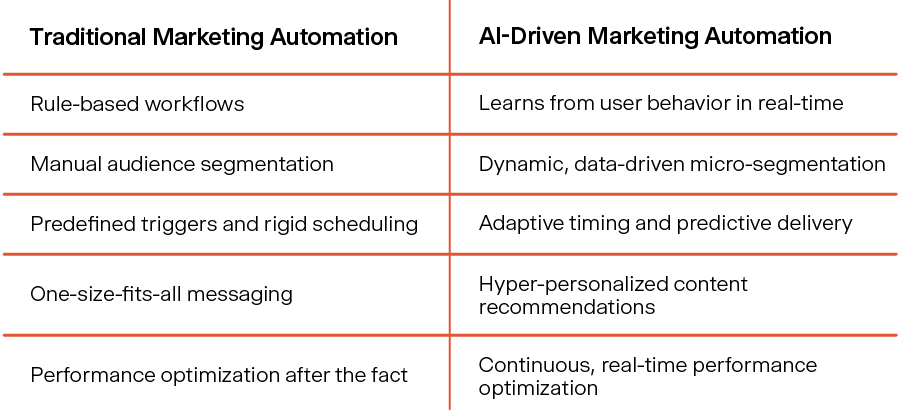AI Marketing Automation: Transform Your Campaigns with Intelligence and Scale
Writer: Jill Enriquez
Date: September 23, 2025
Learn how AI marketing automation enhances targeting, streamlines workflows, and delivers measurable results across every channel.
With customer expectations rising and digital channels expanding, marketers need to do more with less. AI marketing automation tools help leading brands shift from reactive campaign management to proactive performance strategy. By integrating AI tools across the funnel, you can simplify complexity, personalize at scale, and turn performance into profit.

In this guide, we’ll explore what artificial intelligence in marketing means today, and how to harness it to unlock your brand’s full potential.
WHAT IS AI MARKETING AUTOMATION?

AI marketing automation uses artificial intelligence and machine learning to streamline, optimize, and scale marketing workflows and customer interactions. Unlike traditional systems that operate on static rules, AI adapts in real time, using behavioral data to fine-tune campaigns as they run.
You can utilize AI digital marketing strategies to achieve automation across a wide range of use cases, including:
- Real-time bidding
- Dynamic targeting
- Natural language generation
- Predictive content delivery
- Campaign optimization
- Chatbot interactions
AI for marketing automation handles the technical work, but human creativity and strategic thinking remain essential. Automating routine tasks gives your team more time to develop innovative campaigns that drive real growth.
AI MARKETING STRATEGY VS. TRADITIONAL MARKETING AUTOMATION
Traditional marketing automation relies on rule-based workflows and preset triggers. These systems are effective for foundational tasks but fall short in dynamic, data-driven environments.
AI-powered strategies, by contrast, respond to real-time signals and customer behavior. They optimize continuously and personalize communication far beyond what static automation can achieve.
Here’s how traditional automation stacks up against an AI marketing automation strategy.

While traditional platforms may still support foundational tasks and basic campaign execution, AI-driven methodologies take performance and precision to the next level. With machine learning, marketing automation becomes adaptive, predictive, and self-optimizing, empowering teams to make smarter decisions, faster.
At Simpli.fi, we help you transition from legacy systems to intelligent automation that enhances every stage of your campaign lifecycle.
TWO REVOLUTIONARY IMPACTS OF AI IN DIGITAL MARKETING
AI revolutionizes marketing through two complementary approaches: streamlining operations and generating actionable insights. This combination accelerates execution while sharpening strategic decision-making across campaigns.
Task Automation
AI manages repetitive, high-volume processes with precision and speed, freeing your team to focus on strategic initiatives and creative development. Common automation advantages include:
- Dynamic content generation: Effortlessly generate variations of ad copy, headlines, and landing page elements.
- Paid media bidding: Optimize ad placements and budgets in milliseconds to improve ROI.
- Chatbot support: Deliver instant, always-on customer service with contextual relevance.
- Social media post scheduling: Streamline content distribution across platforms with minimal manual effort.
- Email campaign triggers: Automatically send emails based on real-time user behavior and lifecycle stage.
These automated processes build the foundation for campaigns that scale without sacrificing quality.
Machine Learning Insights
While automation handles execution, machine learning drives data-backed strategy by uncovering patterns and predicting performance. These capabilities reveal opportunities that manual analysis might miss:
- Predictive analytics: Anticipate customer behavior to inform campaign timing and targeting.
- Automated A/B testing: Continuously test and refine creative, offers, and formats in real time.
- Sentiment analysis: Analyze customer feedback and social media to gauge brand perception and emotional response.
- Hyper-specific customer segmentation: Create micro-audiences based on nuanced behavioral and demographic data.
This dual approach of eliminating routine tasks while extracting insights from data shows how marketing automation with AI empowers you to operate with both speed and precision.
THE FOUR TYPES OF AI IN MARKETING

AI encompasses multiple technologies you can deploy strategically across your campaigns. By looking at these functional categories, you’ll better understand how to use AI for marketing to help you match the right intelligence to the right task for maximum impact.
Generative AI
Generative AI creates original content instantly, from ad copy and email subject lines to product descriptions and calls-to-action. Models like DALL·E 2 from OpenAI can generate high-quality images and video from text prompts, allowing you to scale creative output rapidly. With 51% of marketers already using this technology for content creation, AI Generated Ads have moved from concept to reality.
Predictive AI
Predictive AI analyzes historical data and real-time user behavior to forecast customer actions. From identifying churn risk and surfacing high-value leads to recommending the next best products, these tools enable you to anticipate customer needs and stay one step ahead. This proactive approach delivers sharper targeting and perfectly timed outreach throughout the customer journey.
Prescriptive AI
Prescriptive AI recommends specific actions based on data analysis. These models convert predictive insights into actionable strategies, which are particularly valuable in automated campaign management. Prescriptive AI can guide audience targeting, creative variation, budget allocation, message refinement, and channel selection decisions.
Conversational AI
Chatbots and virtual assistants engage customers directly, handling everything from lead qualification to post-sale service. They provide immediate, contextually relevant responses around the clock across web, mobile, and social platforms. This technology drives measurable improvements in customer satisfaction while reducing operational costs for service teams.
KEY BENEFITS OF AI MARKETING AUTOMATION
When implemented thoughtfully, AI shifts your campaigns from reactive guesswork to strategic precision, delivering the kind of results that separate market leaders from followers.
Here’s how AI marketing automation creates tangible competitive advantages:
- Enhanced Personalization: AI enables you to tailor messages, offers, and content based on behavioral signals, preferences, and past interactions for campaigns that feel less like mass marketing and more like 1:1 conversations.
- Operational Efficiency: Automated workflows handle repetitive tasks, freeing your team to focus on strategy and creative development.
- Data-Driven Insights: AI continuously analyzes performance to reveal patterns you might otherwise miss. These insights drive smarter, faster decisions.
- Predictive Targeting: AI anticipates customer behavior and delivers relevant messaging before they take action. This proactive approach increases engagement and conversion rates.
- Omnichannel Scalability: AI maintains consistent, personalized messaging whether you’re running CTV, mobile, social, or display campaigns. Every interaction moves prospects closer to conversion.
5 Steps to Implement a Winning AI Marketing Strategy
Most companies rush into AI without a plan, then wonder why their campaigns underperform. The key is building systematically rather than chasing every new feature. These five steps provide a proven path to effective implementation and long-term impact:
- Pick One Use Case
Start with a clear, measurable objective. Whether it’s improving CTR, reducing churn, or refining audience targeting, focus on solving one specific problem. Early wins build momentum and set the foundation for broader adoption. - Clean Your Data
AI is only as effective as the data it learns from. Review your datasets to ensure accuracy, completeness, and consistency. Eliminate redundancies, resolve gaps, and unify tracking. Clean data fuels smarter insights and stronger performance. - Select Integrated Tools
Avoid a patchwork of disconnected platforms. Choose a solution that consolidates campaign execution, audience targeting, optimization, and analytics. Simpli.fi’s platform is built to integrate these functions, essentially eliminating silos and improving agility. - Connect Your Systems
Ensure your AI tools communicate with your CRM, ad accounts, and analytics dashboards. A fully connected ecosystem allows insights to flow freely, supporting better decisions across the funnel. Don’t forget to align with data privacy standards like GDPR and CCPA. - Start Small, Optimize Fast
Run a pilot campaign using your new setup. Monitor performance closely, learn from the results, and iterate. Keep human oversight at the center: AI enhances scale and precision, but brand voice and strategic direction still require a human touch.
As you scale, ensure your team is trained to work effectively with your new AI tools so they can drive continuous improvement, not just operate the software.
WHAT’S NEXT: THE FUTURE OF AI IN MARKETING
The AI capabilities marketers use today are just the beginning. Emerging technologies are set to redefine how brands engage audiences, deliver content, and drive performance.
Here’s a look at what’s ahead:
- Autonomous campaigns: AI may soon manage entire campaign lifecycles from planning and creative generation to deployment and optimization. Marketers will set objectives, and AI will execute the strategy, monitor performance, and make adjustments in real time.
- Personalized messaging: Forget audience segments. Advanced algorithms will customize every message, offer, and experience for each person based on their immediate context and predicted behavior patterns.
- Voice-first engagement: As conversational AI becomes more advanced, customers may interact with brands via voice in more meaningful ways. These tools will recognize tone, emotion, and intent, enabling natural, frictionless communication across platforms.
- Dynamic creative generation: AI-generated visuals, videos, and copy will automatically tailor themselves by platform, audience, and campaign goal. Every creative asset will be optimized in real time for impact and relevance.
These innovations will reshape not only how marketers work, but also how consumers experience brands. The teams that embrace this shift early will be better equipped to drive growth, loyalty, and ROI in a rapidly evolving landscape.
Simpli.fi is constantly optimizing our platform to support these emerging capabilities, ensuring our partners can capitalize on innovations as they become available.
HOW SIMPLI.FI POWERS AI MARKETING AUTOMATION
Whether you’re launching your first AI campaign or scaling advanced omnichannel strategies, our Advertising Success Platform delivers the intelligence and precision you need to compete effectively.
We’ve designed our programmatic advertising solutions to harness AI across every aspect of campaign management:
- Intelligent targeting: Machine learning algorithms analyze audience behavior patterns to identify optimal placements and maximize conversion potential.
- Automated bidding: Our platform manages real-time bidding strategies across all inventory sources, adjusting in milliseconds to capture the best opportunities while controlling costs.
- Data-driven insights: Advanced analytics transform your first-party data into actionable audience segments, enabling personalized messaging at scale.
- Cross-channel coordination: Execute unified campaigns across CTV, mobile, display, social media, and more with consistent messaging and optimized performance.
With Simpli.fi, everything works together, which eliminates the inefficiencies of disconnected tools and vendors.
Ready to adopt AI marketing automation to drive tangible results? Explore our comprehensive suite of solutions and contact our team to learn more.
 | Jill Enriquez Director of Brand and Content Marketing | Simpli.fi Jill Enriquez is an experienced leader in brand and content marketing, with a career defined by multiple director-level roles that underscore her expertise and future-focused vision. As the Director of Brand and Content Marketing at Simpli.fi, Jill spearheads strategic initiatives that elevate brand impact and drive market relevance. Her leadership experience spans top agencies, where she has consistently crafted high-impact marketing strategies, cultivated long-term client partnerships, and led teams through key industry transformations, solidifying her standing as a trusted and visionary authority in the rapidly evolving world of marketing. |
Relevant Resources
